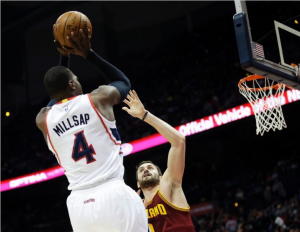 Through the first five games of the NBA playoffs, Paul Millsap has attempted 17 3-pointers and has hit on eight of them. With each shot, Millsap’s confidence from long range has grown.
Through the first five games of the NBA playoffs, Paul Millsap has attempted 17 3-pointers and has hit on eight of them. With each shot, Millsap’s confidence from long range has grown. 
That confidence is well warranted. Since signing with the Hawks in the summer of 2013, Millsap has become an entirely different player in approach and efficiency. Once an undersized bruiser bounded to the paint and midrange in Utah, Millsap has evolved into an analytics-savvy stretch forward equipped with the grit and toughness that guided him to the NBA in the first place.
Consider this: in his first seven seasons in the NBA, Millsap attempted just 113 3-pointers and converted on just 31. On average, Millsap made just over four 3-pointers for the entire season through his first seven years (hitting on just 27% of them).
In two seasons with the Hawks, Millsap has learned to let the long ball fly. He’s attempted an eye opening 428 3-pointers in two seasons — an astronomical 1238% percent increase in annual attempts from his days in Utah. Despite the increased volume of perimeter shots, Millsap’s managed to become more efficient from range as well, hitting on 35.7% of those attempts — a clip that dances comfortably above the league average.
For visual sake, here’s a comparison of Millsap’s shot chart in 2011-12 with Utah to this season’s shot chart in Atlanta (per NBASavant.com):
“He was always able to [shoot] it in Utah and now he’s just getting the opportunity to do it now,” said DeMarre Carroll, a teammate of Millsap’s in Utah and Atlanta. “He’s just taking advantage of his opportunity.”
It’s no secret that Atlanta’s offense is predicated on the long ball. The Hawks attempted the seventh most 3-pointers in the league during the regular season. Millsap’s ability to shoot from deep at a front court position is crucial for Atlanta’s spacing, which led them to the sixth most efficient offense in the league.
Millsap credits his 3-point proficiency to Atlanta’s coaching staff and the consistent routine implemented on his shooting regimen:
“Since I got here I’ve gotten a good routine,” Millsap told Sheridan Hoops. “The coaching staff definitely helped me out a lot. I’m just staying with the routine throughout the whole year. Last year I stayed with the routine. This year I’ve stayed with the routine throughout. It’s helped me out a lot.”
But for as cliché as Millsap’s response might have been, Millsap’s 3-point shooting split-stats from home to road games are anything but.
What’s so fascinating with Millsap’s improvement as a shooter is not how he’s making his threes as much as where he’s making his threes. In the case of Millsap, location from behind the 3-point line seems to matter less than the location of where the game is being played.
For his career, Millsap has been a markedly more aggressive player on the road: despite playing 346 fewer minutes on the road for his career, Millsap has made and attempted more field goals playing away from home.
In an interview with Sheridan Hoops from October of 2013, Millsap acknowledged that he prefers playing games on the road:
“For me, it’s always been the case that I like playing on the road,” Millsap said. “You and your teammates just have an extra chip on your shoulder so that works well for me, personally. I believe I shot more in rhythm on the road last season.”
This year, however, Millsap’s career trends have flipped:

In 2014-2015 alone, Millsap made 48 3-pointers at home — a 50% increase in makes from the four-year span from 2010-2014. On the flip side, Millsap’s 3-point efficiency on the road has tapered off. While he was a 40% 3-point shooter on the road from 2010-2014, he’s regressed to a pedestrian 30% 3-point percentage in 2014-15.
When asked about the significant twist, Millsap was stumped: “I don’t know how to answer that.”
Whatever the reason may be, the Hawks are comforted to know they own home court advantage throughout the Eastern Conference playoffs. With a critical Game 6 matchup on tonight in Brooklyn, the Hawks will look to close out a first-round series that has played closer than anyone has expected.
Jacob Eisenberg is a college senior at Emory University and works as an NBA columnist for Sheridan Hoops, specializing in analytics-based scouting reports for individual players. Follow him on Twitter and check out his website.
